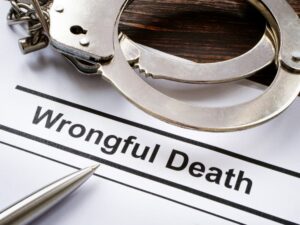The loss of a loved one is always a devastating experience, but someone else's negligence or wrongful actions lead to a death, it adds a layer of complexity to the grieving process. If your loved one has been died due to another party's negligence, reach out to an Austin wrongful death lawyer for legal assistance. This is where the concept of wrongful death comes into play. In this blog, we will explore the definition of wrongful death, its common causes, the legal aspects surrounding it, and the impact it has on the affected families.
Seeking a Wrongful Death Claim
Wrongful death extends beyond the realm of personal tragedy, encompassing legal implications for those responsible. Surviving family members of someone who died due to negligence or wrongful acts of another may seek compensation through a wrongful death claim. Wrongful death cases can arise from various situations, such as:- Car accidents
- Truck accidents
- Pedestrian accidents
- Medical malpractice
- Workplace incidents
Do I Have a Wrongful Death Claim?
Proving a wrongful death involves establishing that the death was the result of someone else's negligence, recklessness, or intentional misconduct.
This complex process requires you to establish four key elements of negligence:
- Establishing Duty of Care: Identify the responsible party and establish that they owe a duty of care to the deceased. Duty of care varies based on the circumstances. For example, a driver must follow traffic laws, and a healthcare professional must provide a standard level of care.
- Breach of Duty: Demonstrate that the responsible party breached their duty of care. This involves showing that their actions or negligence deviated from the standard expected under the circumstances. This could include reckless driving, medical malpractice, or failure to maintain a safe environment.
- Causation: Establish a direct link between the breach of duty and the death. You must demonstrate that the actions or negligence of the responsible party caused the fatal incident.
- Damages: Show the damages the wrongful death caused. This includes financial losses such as medical expenses, funeral costs, and the lost income of the deceased. Include non-economic damages such as emotional pain and suffering.
How Do I Prove Wrongful Death?
The complex legal process for proving a wrongful death can require a thorough investigation and presentation of evidence. Here are some important considerations involved in proving a wrongful death:Gathering Evidence
Collect all relevant evidence, including accident reports, witness statements, medical records, expert opinions, and any available surveillance footage. The strength of your case relies heavily on the quality and quantity of evidence.Expert Testimony
In many cases, expert witnesses may establish the standard of care and demonstrate how the responsible party's actions deviated from that standard. For example, a medical expert may testify about the standard of care in a medical malpractice case.Documentation
Keep detailed records of all expenses related to the death, including medical bills, funeral costs, and any other financial losses. This documentation will help determine the amount of damages sought in a wrongful death lawsuit.Statute of Limitations
The statute of limitations sets the legal time limit within which plaintiffs must file a wrongful death lawsuit. Missing this deadline could result in the loss of the right to pursue legal action.Negotiation or Trial
After gathering evidence and consulting with an attorney, you may pursue a settlement through negotiations or proceed to trial. Many wrongful death cases settle out of court, but if you cannot reach a fair settlement, your case may go to trial.Should I Hire a Lawyer to Help with My Wrongful Death Case?
 An experienced personal injury lawyer can handle your wrongful death claim, navigate the legal complexities, protect your rights, and maximize the chances of a successful outcome. Here are several ways in which a lawyer can assist you with your wrongful death claim:
An experienced personal injury lawyer can handle your wrongful death claim, navigate the legal complexities, protect your rights, and maximize the chances of a successful outcome. Here are several ways in which a lawyer can assist you with your wrongful death claim:
Legal Knowledge
A lawyer specializing in wrongful death cases in Texas will have a deep understanding of the complex applicable laws, rules, and regulations in the state. This knowledge builds a strong case.Investigation and Evidence Gathering
Lawyers have the resources and experience to thoroughly investigate the wrongful death. They can gather evidence, interview witnesses, work with experts, and obtain relevant documents to build a compelling case.Establishing Liability
A lawyer will analyze the facts, assess the duty of care owed by the responsible party, and establish how their actions or negligence led to the fatal incident.Valuing Damages
Assessing the full extent of damages in a wrongful death case involves considering both economic and non-economic factors. Lawyers can determine the value of medical expenses, funeral costs, lost income, and non-economic damages such as pain and suffering.Negotiating With Insurance Companies
Insurance companies representing the at-fault party may try to settle the case quickly and for a lower amount. Lawyers are skilled negotiators who can advocate for fair compensation on your behalf, ensuring that you are not taken advantage of during settlement discussions.Filing the Lawsuit and Meeting Deadlines
A lawyer will handle all aspects of filing a wrongful death lawsuit, completing the necessary paperwork accurately and filing it within the applicable statute of limitations, which is generally two years from the date of the decedent’s death. Missing deadlines could result in the loss of your right to pursue legal action.Engaging Expert Witnesses
In many wrongful death cases, expert witnesses can provide insight into complex issues such as medical malpractice, accident reconstruction, or product defects. Lawyers have access to a network of qualified experts who can strengthen your case.Preparing for Trial
If you cannot reach a fair settlement, a lawyer will prepare your case for trial. This involves developing a compelling legal strategy, presenting evidence, and arguing your case in court.Providing Emotional Support
A compassionate lawyer can provide emotional support, explain the legal proceedings, and guide you through each step with empathy.Experience in Wrongful Death Cases
Lawyers specializing in wrongful death cases bring valuable experience to the table. They understand the nuances of these cases, have handled similar situations, and can anticipate challenges that may arise during the legal process.Protecting Your Rights
A lawyer acts as your advocate, protecting your rights throughout the legal process. They will secure the best possible outcome for you and your family.Closure and Accountability
Pursuing a wrongful death claim is not just about compensation; it's also about seeking justice, closure, and accountability. A lawyer can help you achieve these goals by holding the responsible party accountable for their actions.Seeking Justice Through a Wrongful Death Claim

